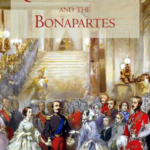 Theo Aronson’s latest work, Queen Victoria and the Bonapartes, explores the personal relationships between Queen Victoria, Emperor Napoleon III and Empress Eugenie of France. It opens a wide window on a colourful and somewhat surprising series of encounters between monarchs that influenced relations and perceptions of each other in the eyes of the public. The Second Empire re-established Napoleonic aspirations in France and rekindled a sense of glory and elan superbly captured by Aronson. The revanchist ideals of the Bonapartist dynasty represented all that the British royal family should have been threatened by, yet a lasting (although sometimes fraught) personal relationship was established that influenced Anglo-French political relationships.
Theo Aronson’s latest work, Queen Victoria and the Bonapartes, explores the personal relationships between Queen Victoria, Emperor Napoleon III and Empress Eugenie of France. It opens a wide window on a colourful and somewhat surprising series of encounters between monarchs that influenced relations and perceptions of each other in the eyes of the public. The Second Empire re-established Napoleonic aspirations in France and rekindled a sense of glory and elan superbly captured by Aronson. The revanchist ideals of the Bonapartist dynasty represented all that the British royal family should have been threatened by, yet a lasting (although sometimes fraught) personal relationship was established that influenced Anglo-French political relationships.
Relying primarily on correspondence between the Queen, Empress, Emperor and other family members and officials – much of it previously unpublished, Aronson delivers another superbly readable and engaging history. Uniquely capturing the emotional, familial and personal relationships, it sets them within the larger context of the times and explores some of the wider public implications of these intimate exchanges.
Like the author’s previous works, the results are eminently readable and adeptly draw from a wide variety of sources, tying them together in a well-paced narrative. Generally well-balanced in the treatment of the personages concerned, special attention is paid to the relationship between the two Empresses. Both revealing and thoughtfully considered it sheds new light on a relationship that was equally significant to each and rather unique in history. Both monarchs experienced early grief in their lives and together supported one another through challenges, and dealing with that grief in unique and different ways.
This remains a biography of relationships of a more personal nature and limits discussion of the greater political implications of these monarchical machinations. On the occasion of French involvement in the Crimean War, Aronson addresses the influence of Victoria over the Emperor and attempts to dissuade him from personal involvement. However, one remains curious of the wider influence of triangle of influence between Victoria, Albert, her daughters and German-French-English relations and details of French national and political reaction to the continuing close relationship between the English monarchy and the deposed Bonaparates.
I was particularly struck and impressed by Aronson’s interpretation of the appeal to Victoria of the charming Emperor and the elegant Empress and the impact they had on her. This forms a significant part of this work and is deftly handled.
In all this is another superb contribution by Theo Aronson to a gap in the scholarship worthy of exploration. It is readable and highly recommended.
I gratefully received a review copy of this book from NetGalley
